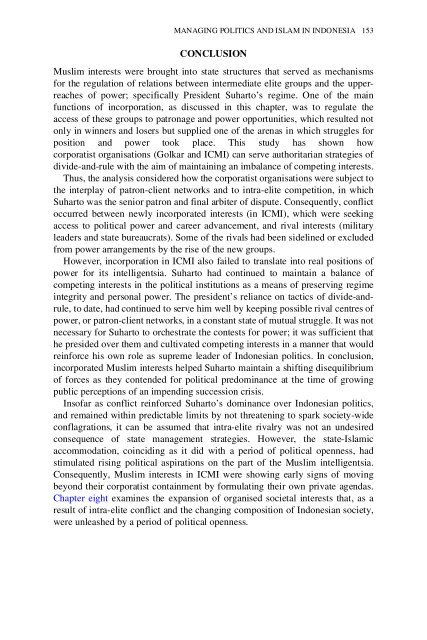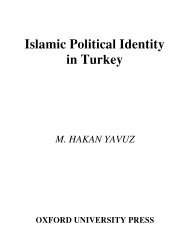You also want an ePaper? Increase the reach of your titles
YUMPU automatically turns print PDFs into web optimized ePapers that Google loves.
MANAGING POLITICS AND ISLAM IN INDONESIA 153CONCLUSIONMuslim <strong>in</strong>terests were brought <strong>in</strong>to state structures that served as mechanismsfor the regulation of relations between <strong>in</strong>termediate elite groups <strong>and</strong> the upperreachesof power; specifically President Suharto’s regime. One of the ma<strong>in</strong>functions of <strong>in</strong>corporation, as discussed <strong>in</strong> this chapter, was to regulate theaccess of these groups to patronage <strong>and</strong> power opportunities, which resulted notonly <strong>in</strong> w<strong>in</strong>ners <strong>and</strong> losers but supplied one of the arenas <strong>in</strong> which struggles forposition <strong>and</strong> power took place. This study has shown howcorporatist organisations (Golkar <strong>and</strong> ICMI) can serve authoritarian strategies ofdivide-<strong>and</strong>-rule with the aim of ma<strong>in</strong>ta<strong>in</strong><strong>in</strong>g an imbalance of compet<strong>in</strong>g <strong>in</strong>terests.Thus, the analysis considered how the corporatist organisations were subject tothe <strong>in</strong>terplay of patron-client networks <strong>and</strong> to <strong>in</strong>tra-elite competition, <strong>in</strong> whichSuharto was the senior patron <strong>and</strong> f<strong>in</strong>al arbiter of dispute. Consequently, conflictoccurred between newly <strong>in</strong>corporated <strong>in</strong>terests (<strong>in</strong> ICMI), which were seek<strong>in</strong>gaccess to political power <strong>and</strong> career advancement, <strong>and</strong> rival <strong>in</strong>terests (militaryleaders <strong>and</strong> state bureaucrats). Some of the rivals had been sidel<strong>in</strong>ed or excludedfrom power arrangements by the rise of the new groups.However, <strong>in</strong>corporation <strong>in</strong> ICMI also failed to translate <strong>in</strong>to real positions ofpower for its <strong>in</strong>telligentsia. Suharto had cont<strong>in</strong>ued to ma<strong>in</strong>ta<strong>in</strong> a balance ofcompet<strong>in</strong>g <strong>in</strong>terests <strong>in</strong> the political <strong>in</strong>stitutions as a means of preserv<strong>in</strong>g regime<strong>in</strong>tegrity <strong>and</strong> personal power. The president’s reliance on tactics of divide-<strong>and</strong>rule,to date, had cont<strong>in</strong>ued to serve him well by keep<strong>in</strong>g possible rival centres ofpower, or patron-client networks, <strong>in</strong> a constant state of mutual struggle. It was notnecessary for Suharto to orchestrate the contests for power; it was sufficient thathe presided over them <strong>and</strong> cultivated compet<strong>in</strong>g <strong>in</strong>terests <strong>in</strong> a manner that wouldre<strong>in</strong>force his own role as supreme leader of <strong>Indonesia</strong>n politics. In conclusion,<strong>in</strong>corporated Muslim <strong>in</strong>terests helped Suharto ma<strong>in</strong>ta<strong>in</strong> a shift<strong>in</strong>g disequilibriumof forces as they contended for political predom<strong>in</strong>ance at the time of grow<strong>in</strong>gpublic perceptions of an impend<strong>in</strong>g succession crisis.Insofar as conflict re<strong>in</strong>forced Suharto’s dom<strong>in</strong>ance over <strong>Indonesia</strong>n politics,<strong>and</strong> rema<strong>in</strong>ed with<strong>in</strong> predictable limits by not threaten<strong>in</strong>g to spark society-wideconflagrations, it can be assumed that <strong>in</strong>tra-elite rivalry was not an undesiredconsequence of state management strategies. However, the state-<strong>Islam</strong>icaccommodation, co<strong>in</strong>cid<strong>in</strong>g as it did with a period of political openness, hadstimulated ris<strong>in</strong>g political aspirations on the part of the Muslim <strong>in</strong>telligentsia.Consequently, Muslim <strong>in</strong>terests <strong>in</strong> ICMI were show<strong>in</strong>g early signs of mov<strong>in</strong>gbeyond their corporatist conta<strong>in</strong>ment by formulat<strong>in</strong>g their own private agendas.Chapter eight exam<strong>in</strong>es the expansion of organised societal <strong>in</strong>terests that, as aresult of <strong>in</strong>tra-elite conflict <strong>and</strong> the chang<strong>in</strong>g composition of <strong>Indonesia</strong>n society,were unleashed by a period of political openness.




